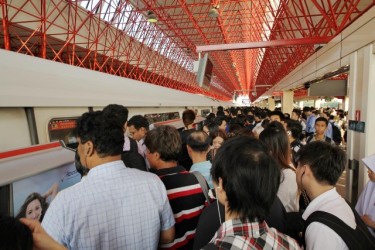Once a symbol of pride and development, Singapore's Mass Rapid Transit (MRT) [1] trains now come with a warning: ride at your own risk. Four breakdowns and assorted delays over the past week have left many commuters stranded, late for work and exams.
Lucky Tan describes [2] getting stuck in the Circle Line breakdown:
I was on a Circle Line train when it broke down. My train which was very crowded stopped at one of the stations and there was an announcement saying that the train was delayed. 20-30 minutes later we were told the Circle Line was down and everyone scrambled out. I took a bus (not the emergency one but normal service) to a satellite town where I tried to get a cab at a taxi stand. Waited more than half an hour before I was able to get one. The train failed and the effects cascaded into the taxi system because everyone would be trying to dial for a cab and the availability falls to zero- I tried calling Comfort-Delgro but the system wasn't able to allocate a taxi after 20 minutes. Got to work about 1 hour 15 minutes late.
So many people have been affected by delays that SMRT has begun to issue [4] train delay chits:
@sochris [5]: LOL
#SMRT [6] issues timeslips for commuters caught in train disruptions! where else in the world will you find this?

@FakeSMRTCEO, a satirical Twitter account, compared riding the trains to current blockbuster The Hunger Games:
@smrtceo [7]: I've decided to change
#SMRT [6]‘s motto from “Moving People, Enhancing Lives” to “May the odds be ever in your favour”
Some Singaporeans have also begun to crack jokes, making a pun out of the name of Land Transport Minister Lui Tuck Yew:
@TheJohnnyBoy [8]: Lui Stuck Yew
#circlelinedown [9]#smrt [10]
The Minister has also announced that there will be weekend disruptions to train services from now on so that maintenance work can be carried out. Although the authorities have promised that measures will be taken to deal with these scheduled shutdowns, Alex Au thinks [11] that we should look into alternative solutions:
I am not going to say that temporary closures should not happen. Experience in other cities shows us they are essential. Nor am I saying that bridging services aren’t part of the solution: they certainly must be. However, I am cautioning against an over-reliance on bridging services because it is user-unfriendly, and will still not be able to cope with heavy passenger loads.
He goes on to propose that there should be more duplication of routes between the buses and trains:
…the most natural way to obtain such redundancy, yet balanced with reasonable attention to cost and profitability, would be to have different companies run bus and train services. Let the bus company judge how much to duplicate the train routes, and therefore compete for the same traffic. The worst outcome would be for the same company to run both the train and bus routes through the same corridor. The result will tend to be a determination to maintain high load levels on the train by cutting away bus services. This may increase the company’s profitability, but it also increases social vulnerability.
The latest occurrences of train breakdowns are happening at a time when the bidding for the Certificates of Entitlement (COE) allowing people to purchase cars hits an all-time high: S$92,000. For many middle class Singaporean families, this makes buying a car simply too expensive to be an option.
Lucky Tan feels [2] that the bidding system for the COE is tilted in favour of the rich:
The main problem with the COE system it allocates a scarce resource based on a person's ability to pay rather than his needs. A middle income parent who has to ferry his children to school and take his parents to hospital can be out-bidded by a multi-millionaires's son who uses the car for dates and clubbing. The disadvantage of such a system is it causes an ever widening gap of unfulfilled demand among those with the greatest need for a car. In Singapore, where the income gap is so wide, over time more and more COEs will just go the rich rather than people who need it.
In his letter to the Straits Times forum, Chan Tau Chou agrees [12], and suggests that a balloting system be adopted instead:
The number of cars sold can at most match the number of COEs available, regardless of the COE price. This means it is unnecessary to have a price beyond an administrative fee required to run the system, which is meant to control car ownership and not generate revenue.
If important aspects like housing and education can be subject to balloting, surely a system can be designed to ballot for cars.
